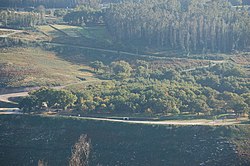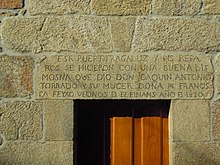| Revision as of 05:39, 21 December 2024 editShatiblo (talk | contribs)Extended confirmed users557 editsNo edit summaryTag: Visual edit← Previous edit | Latest revision as of 00:04, 22 December 2024 edit undoRosiestep (talk | contribs)Autopatrolled, Administrators303,565 edits header caps per MOS:HEAD | ||
| (One intermediate revision by one other user not shown) | |||
| Line 1: | Line 1: | ||
| {{Orphan|date=December 2024}} | |||
| ] | ] | ||
| The '''Carballeira de San Xusto''' is an ] located in the parish of San Xurxo de Sacos (]), on a hill above the ], near the ], in ]. |
The '''Carballeira de San Xusto''' is an ] located in the parish of San Xurxo de Sacos (]), on a hill above the ], near the ], in ]. | ||
| == Characteristics == | == Characteristics == | ||
| Line 7: | Line 9: | ||
| It is a traditional gathering place and a reference for legends and old tales; it contains centuries-old oak trees as well as chestnut and American oak trees. Once extensive in area, it has now greatly diminished. | It is a traditional gathering place and a reference for legends and old tales; it contains centuries-old oak trees as well as chestnut and American oak trees. Once extensive in area, it has now greatly diminished. | ||
| Between 1990 and 1996, there was a dispute over the ownership of the carballeira between the parishioners of San Xurxo de Sacos and the ]<ref> {{Webarchive|url=https://web.archive.org/web/20161022025824/http://www.lavozdegalicia.es/hemeroteca/2007/06/20/5914253.shtml?idioma=galego|date=October 22, 2016}}, article by Cristina Barral in '']'', June 20, 2007.</ref> |
Between 1990 and 1996, there was a dispute over the ownership of the carballeira between the parishioners of San Xurxo de Sacos and the ].<ref> {{Webarchive|url=https://web.archive.org/web/20161022025824/http://www.lavozdegalicia.es/hemeroteca/2007/06/20/5914253.shtml?idioma=galego|date=October 22, 2016}}, article by Cristina Barral in '']'', June 20, 2007.</ref> On June 6, 1990, the parish priest Manuel Lorenzo registered in ] the ownership of this space and the mountain of Lixó on behalf of the Church.<ref>On the other side of the river, in the place of Fentáns, also in the parish of San Xurxo de Sacos, and where the chapel of Nosa Señora de Lixó is located.</ref> After various acts of protest and years of confrontation, the Provincial Court and the Supreme Court upheld the resolution issued by a preliminary court that sided with the parishioners. The ownership of the carballeira belongs to the Community of Montes of the parish. | ||
| During the wildfire wave of 2006 in Galicia, a strong fire descended from Cerdedo to Pontevedra along the banks of the Lérez River, passing near the carballeira on August 5. The villagers celebrating the pilgrimage had to leave in haste, either to escape the fire or to help extinguish it. Ultimately, the carballeira was saved. In gratitude, a devotee of Saints Xusto and Pastor brought popular singers to the festivities in subsequent years, such as ], ], or ], attracting thousands of people to the carballeira<ref>, article by Cristina Barral in '']'', August 1, 2008.</ref> |
During the wildfire wave of 2006 in Galicia, a strong fire descended from Cerdedo to Pontevedra along the banks of the Lérez River, passing near the carballeira on August 5. The villagers celebrating the pilgrimage had to leave in haste, either to escape the fire or to help extinguish it. Ultimately, the carballeira was saved. In gratitude, a devotee of Saints Xusto and Pastor brought popular singers to the festivities in subsequent years, such as ], ], or ], attracting thousands of people to the carballeira.<ref>, article by Cristina Barral in '']'', August 1, 2008.</ref> | ||
| == Architectural |
== Architectural heritage == | ||
| ] | ] | ||
| It is presided over by a cruceiro and a chapel, where the pilgrimage of Saints Xusto and Pastor is celebrated on ] and ]. In the past, the ] was performed in the carballeira, and the local youths hunted wild goats by descending the cliffs of the valley<ref>Fraguas Fraguas, A.: "Saints Xusto and Pastor in San Xorxe de Sacos", in ''Pilgrimages and sanctuaries'' (1988).</ref> |
It is presided over by a cruceiro and a chapel, where the pilgrimage of Saints Xusto and Pastor is celebrated on ] and ]. In the past, the ] was performed in the carballeira, and the local youths hunted wild goats by descending the cliffs of the valley.<ref>Fraguas Fraguas, A.: "Saints Xusto and Pastor in San Xorxe de Sacos", in ''Pilgrimages and sanctuaries'' (1988).</ref> The community and pilgrims participated in the saint's procession through the parish, which included images of various saints as well as the banner of the Agricultural Society of San Xurxo de Sacos, founded in 1903. Some pilgrims came with offerings, bringing coffins and offerings to be bid upon. | ||
| ] | ] | ||
| The small chapel preserves the covered presbytery, from the 15th or 16th century, with a ribbed vault. The nave dates from the 18th century. Above the main door, there is a stone with the following inscription in Spanish (pictured): | The small chapel preserves the covered presbytery, from the 15th or 16th century, with a ribbed vault. The nave dates from the 18th century. Above the main door, there is a stone with the following inscription in Spanish (pictured): | ||
| {{ |
{{Blockquote|}} | ||
| ] | ] | ||
| Above a door on the southern-side wall, there is another stone with the following inscription in Spanish (pictured): | Above a door on the southern-side wall, there is another stone with the following inscription in Spanish (pictured): | ||
| {{ |
{{Blockquote|}}]In June 2007, a statue commemorating the community's struggle was inaugurated, conceived by the sculptor ] and completed by students of the Escola de Canteiros de Poio.<ref>The sculptor could not finish it due to health reasons.</ref> The sculpture includes the following inscription: | ||
| ⚫ | {{ |
||
| ⚫ | {{Blockquote|''Carballeira do San Xusto / carballeira enramada. / ¡Ao pé dous teus cen carballos / plantei a miña palabra! / 1990-1996 | ||
| Translation: ''San Justo oak tree / branched oak tree. / At the foot of your two hundred oaks / I planted my word! / 1990-1996"}} | Translation: ''San Justo oak tree / branched oak tree. / At the foot of your two hundred oaks / I planted my word! / 1990-1996"}} | ||
| Line 38: | Line 39: | ||
| </gallery> | </gallery> | ||
| == |
== References == | ||
| {{Reflist| |
{{Reflist|30em}} | ||
| ] | ] | ||
Latest revision as of 00:04, 22 December 2024
| This article is an orphan, as no other articles link to it. Please introduce links to this page from related articles; try the Find link tool for suggestions. (December 2024) |

The Carballeira de San Xusto is an oak forest located in the parish of San Xurxo de Sacos (Cerdedo-Cotobade), on a hill above the Lérez River, near the Ria de Pontevedra, in Galicia, Spain.
Characteristics

It is a traditional gathering place and a reference for legends and old tales; it contains centuries-old oak trees as well as chestnut and American oak trees. Once extensive in area, it has now greatly diminished.
Between 1990 and 1996, there was a dispute over the ownership of the carballeira between the parishioners of San Xurxo de Sacos and the Archdiocese of Santiago de Compostela. On June 6, 1990, the parish priest Manuel Lorenzo registered in Ponte Caldelas the ownership of this space and the mountain of Lixó on behalf of the Church. After various acts of protest and years of confrontation, the Provincial Court and the Supreme Court upheld the resolution issued by a preliminary court that sided with the parishioners. The ownership of the carballeira belongs to the Community of Montes of the parish.
During the wildfire wave of 2006 in Galicia, a strong fire descended from Cerdedo to Pontevedra along the banks of the Lérez River, passing near the carballeira on August 5. The villagers celebrating the pilgrimage had to leave in haste, either to escape the fire or to help extinguish it. Ultimately, the carballeira was saved. In gratitude, a devotee of Saints Xusto and Pastor brought popular singers to the festivities in subsequent years, such as Manolo Escobar, Bertín Osborne, or David Bustamante, attracting thousands of people to the carballeira.
Architectural heritage

It is presided over by a cruceiro and a chapel, where the pilgrimage of Saints Xusto and Pastor is celebrated on August 5 and 6. In the past, the sword dance was performed in the carballeira, and the local youths hunted wild goats by descending the cliffs of the valley. The community and pilgrims participated in the saint's procession through the parish, which included images of various saints as well as the banner of the Agricultural Society of San Xurxo de Sacos, founded in 1903. Some pilgrims came with offerings, bringing coffins and offerings to be bid upon.

The small chapel preserves the covered presbytery, from the 15th or 16th century, with a ribbed vault. The nave dates from the 18th century. Above the main door, there is a stone with the following inscription in Spanish (pictured):

Above a door on the southern-side wall, there is another stone with the following inscription in Spanish (pictured):

In June 2007, a statue commemorating the community's struggle was inaugurated, conceived by the sculptor Alfonso Vilar and completed by students of the Escola de Canteiros de Poio. The sculpture includes the following inscription:
Carballeira do San Xusto / carballeira enramada. / ¡Ao pé dous teus cen carballos / plantei a miña palabra! / 1990-1996 Translation: San Justo oak tree / branched oak tree. / At the foot of your two hundred oaks / I planted my word! / 1990-1996"
Gallery
-
 Chapel of Saints Xusto and Pastor.
Chapel of Saints Xusto and Pastor.
-
 Carballeira de San Xusto.
Carballeira de San Xusto.
-
 Plaques on the south wall of the chapel.
Plaques on the south wall of the chapel.
-
 Songs.
Songs.
References
- "A monument will commemorate the community's struggle for the Carballeira de San Xusto" Archived October 22, 2016, at the Wayback Machine, article by Cristina Barral in La Voz de Galicia, June 20, 2007.
- On the other side of the river, in the place of Fentáns, also in the parish of San Xurxo de Sacos, and where the chapel of Nosa Señora de Lixó is located.
- "Bertín Osborne's hits resonate tonight in San Xusto", article by Cristina Barral in La Voz de Galicia, August 1, 2008.
- Fraguas Fraguas, A.: "Saints Xusto and Pastor in San Xorxe de Sacos", in Pilgrimages and sanctuaries (1988).
- The sculptor could not finish it due to health reasons.